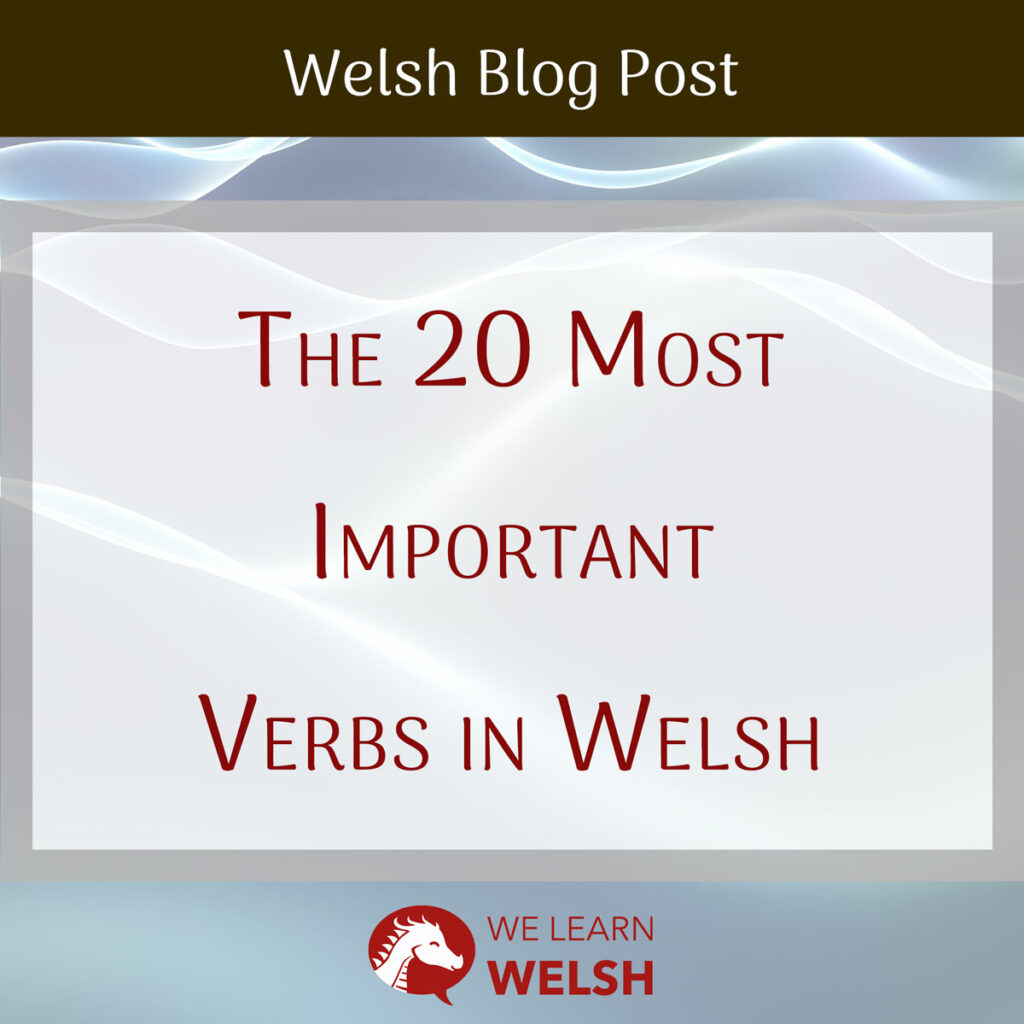Verbs are very important for developing your language skills as they allow you to start building sentences. Without verbs it’s unlikely you will put a meaningful sentence together. The good news is that in comparison to other languages, such as Spanish or French for example, verbs in colloquial Welsh are relatively easy to remember as there as not as many irregular ones.
This article covers some of the most important and useful Welsh verbs in the present tense.

The 5 Main Irregular Verbs (“Berfau Afreolaidd” in Welsh)
Mynd (To go)
Wyt ti’n mynd i’r siop?
Are you going to the shop?
Cael (To have)
Dw i’n cael fy nghinio efo nain heddiw.
I’m having my lunch with grandma today.
Dod (To come)
Wyt ti’n dod*, mam? Wyt ti’n dŵad, mam?
Are you coming, mum?
*Please note that there are variations for this verb. In some parts of North Wales, you will hear the form ‘dŵad’ being used instead, with the accent on the ‘w’. The accent elongates the word so it will sound more like ‘dwwad’.
Gwneud (To do / make)
Hoffwn i wneud* cacen pen-blwydd i dad. / Hoffwn i neud cacen pen-blwydd i dad.
I would like to make a birthday cake for dad.
*Please note that it’s common for people to shorten this verb to “neud” or “gneud” so don’t get confused if you see different variations. This is more common in North Wales.
Bod (To be)
Dw i’n flinedig heddiw!
I’m tired today!
Regular Verbs (“Berfau Rheolaidd” in Welsh)
Gweld (To see)
Hoffwn i fynd i weld fy ffrind yn chwarae rygbi i Gaernarfon.
I would like to go and see my friend play rugby for Caernarfon.
Siarad (To talk)
Hoffwn i siarad gyda’r rheolwr, os gwelwch yn dda.
I would like to speak to the manager, please.
Mwynhau (To enjoy)
Dw i’n mwynhau mynd i’r sinema.
I enjoy going to the cinema.
Gwrando (To listen)
Wyt ti’n gwrando arnaf?
Are you listening to me?
Dweud (To say / tell)
Wyt ti wedi dweud* wrth mam dy fod yn mynd? Wyt ti wedi deud wrth mam dy fod yn mynd?
Have you told mum you’re going?
*Again, it is quite common to hear this verb being shortened to ‘deud’ in North Wales but don’t worry as the meaning hasn’t changed.
Meddwl (To think)
Dw i’n meddwl ei fod yn syniad da.
I think it’s a good idea.
Cyrraedd (To arrive)
Dw i eisiau cyrraedd y briodas ar amser.
I want to arrive at the wedding on time.
Dechrau / Cychwyn (To start)
People often think that ‘cychwyn’ and ‘dechrau’ mean the same thing, but in reality, there is a slight difference between the two words. ‘Cychwyn’ is the form used when setting off somewhere, so think of it as a moving verb:
Dw i’n cychwyn i’r gwaith am wyth bob bore.
I start (from the house) to work at eight o’clock every morning.
However, in other contexts, the word ‘dechrau’ should be used:
Mae hi’n dechrau bwrw eira.
It’s starting to snow.
Hoffwn i ddechrau’r drafodaeth drwy…
I’d like to start the discussion by…
Gofyn (To ask)
Dw i wedi gofyn i Nia os hoffai hi ddod am baned efo ni hefyd.
I’ve asked Nia if she would like to come with us for a cup of tea, too.
Edrych (To look)
Cofia edrych* ar y wefan heno. Mae’r ticedi bron â mynd! Cofia sbïo ar y wefan heno. Mae’r ticedi bron â mynd!
Don’t forget to look at the website tonight. The tickets are almost gone!
*This verb has a variation. In colloquial Welsh of the North, you might hear someone use ‘sbïo’ instead. This word actually derives from ‘ysbïo’ which translates as ‘to spy’!
Gadael (To leave)
Hoffwn i adael gwaith yn gynt heno.
I’d like to leave work earlier tonight.
Gallu (To be able to / Can)
Wyt ti’n gallu* chwarae gwyddbwyll? Wyt ti’n medru chwarae gwyddbwyll?
Are you able to play chess? Can you play chess?
*This verb has a variation as some people in North Wales use ‘medru’ instead of ‘gallu’. You will not come across this variation in South Wales.
Gweithio (To work)
Biti garw nad ydw i’n gweithio gartref.
It’s a pity I don’t work from home.
Cymryd (To take)
Wyt ti wedi cymryd fy siaced newydd o fy llofft?
Have you taken my new jacket from my bedroom?
Aros (To stay / wait)
Mi wna’i aros amdanat yn fan hyn.
I’ll wait for you here.
